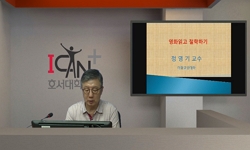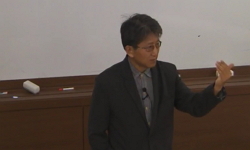We ask the following questions: What is a philosophy? and What does mean it for the philosophy researcher, to research on a philosopher’s philosophy? We research on Heidegger’s philosophy. Every philosophy begins with a man’s doing-philosophy. W...
http://chineseinput.net/에서 pinyin(병음)방식으로 중국어를 변환할 수 있습니다.
변환된 중국어를 복사하여 사용하시면 됩니다.
- 中文 을 입력하시려면 zhongwen을 입력하시고 space를누르시면됩니다.
- 北京 을 입력하시려면 beijing을 입력하시고 space를 누르시면 됩니다.
부가정보
다국어 초록 (Multilingual Abstract)
We ask the following questions: What is a philosophy? and What does mean it for the philosophy researcher, to research on a philosopher’s philosophy? We research on Heidegger’s philosophy. Every philosophy begins with a man’s doing-philosophy. While doing philosophy, someone becomes a philosophy student, a philosophy researcher, and a philosopher. Philosophy researchers generally investigate into a philosopher’s philosophy, and try to have a unique system for their own philosophy. In this research, a philosopher's philosophy is a ladder for the philosophy researchers.
Not all philosophy researchers need the ladder, but we take Heidegger's philosophy as the ladder. In investigating into Heidegger's philosophy, we have arrived at some achievements in our own way. Now we are going to review these achievements by asking the following questions: What are the roots from which we commit moral, ethical, and legal errors in our lives? According to what we get as Heidegger's philosophy, we always inevitably do philosophy as long as we exist in human beings. How do we, doing-philosophy, commit moral, ethical, and legal errors in our lives? Pointing out that the philosophy, investigating into the nature of beings, does not ask the question on Being, Heidegger tries to find the answer to the question, "How does Dasein understand Being?" while analyzing Dasein ontologically in Sein und Zeit. Not asking questions on Being is called Being-forgetting by Heidegger. This Being-forgetting is the forgetting of philosophy, and then the forgetting of human beings. As long as philosophy originates from the doing-philosophy of human beings, so does the forgetting of philosophy from the forgetting of human beings.
There are attempts to find the roots, from which we commit moral, ethical, and legal errors in our lives, in what Heidegger called Being-forgetting. However, Heidegger found Being-understanding of Dasein in the forgetting of philosophy, not to ask questions on Being. The Being, forgotten at the dimension of human beings, is understood at the dimension of Dasein, and this Being-understanding continues to the philosophy, and then to human beings. In this respect, the root, from which we commit moral, ethical, and legal errors in our lives, cannot be Being-forgetting of human beings’.
Analyzing of Dasein in Sein und Zeit, Heidegger discusses on the ordinariness and the non-originality of Dasein. The ordinariness of Dasein seems to be passive or negative compared to the naturalness, and non-originality seems to be passive or negative compared to the originality. There are attempts to find roots, from which we commit moral, ethical, and legal errors in our lives, in the ordinariness and the non-originality of Dasein. However, Heidegger's strategy, distinguishing between the ordinariness and the naturalness of Dasein, and between the originality and non-originality of Dasein, is not intended to show that any problems arise in Being-understanding of Dasein. In this respect, we cannot find the root, from which we commit moral, ethical, and legal errors in our lives, in Being-understanding of Dasein.
According to Heidegger, a doing-philosophy of human being stems from the Being-understanding of Dasein. How can we explain moral, ethical, and legal errors in our lives, especially the philosopher Heidegger's participation in the Nazis? In the following study, we will try to find the answer to this question in the process from the Being-understanding of Dasein to a doing-philosophy of human being.
국문 초록 (Abstract)
“철학이란 도대체 무엇인가?”라는 물음과 함께 “어느 한 철학자의 철학을 연구하는 일은 철학 연구자에게 무슨 의의를 갖는가?”라는 물음을 우리는 지난하게 묻고 있다. 우리는 하이데...
“철학이란 도대체 무엇인가?”라는 물음과 함께 “어느 한 철학자의 철학을 연구하는 일은 철학 연구자에게 무슨 의의를 갖는가?”라는 물음을 우리는 지난하게 묻고 있다. 우리는 하이데거의 철학을 연구하고 있다. 어느 철학이든지 모두 어느 한 인간의 (철학)하기로부터 시작된다. 철학하기를 이어가는 가운데 누군가는 철학도가 되고, 철학 연구자가 되고, 철학자가 된다. 철학 연구자는 대체로 어느 한 철학자의 철학을 연구하면서 자신의 철학하기에 고유한 체계를 갖추려고 기획한다. 이 일에서 어느 한 철학자의 철학은 철학 연구자에게 일종의 사다리이다.
비록 모든 철학 연구자에게 사다리가 필요하지는 않지만, 우리는 철학자인 하이데거의 철학을 사다리로 삼고 있다. 우리는 지금까지 하이데거의 철학을 나름대로 연구하면서 어느 정도의 성과를 이루고는 있다. 이제 우리는 이 성과를 바탕으로 다음과 같은 물음에 대해 검토해 보고자 한다: 우리가 삶에서 도덕적, 윤리적, 법적 오류를 저지르게 되는 뿌리는 무엇인가? 우리가 하이데거의 철학이라고 파악하고 있는 바에 따르면, 우리는 인간으로 실존하는 한, 언제나 필연적으로 철학한다. 그런데 철학하는 우리가 삶에서 도덕적, 윤리적, 법적 오류를 저지른다. 도대체 무엇을 위한 철학인가? 존재자의 본질을 탐구하는 철학이 존재에 대한 물음을 묻지 않는다고 지적하면서, 하이데거는 존재와 시간에서 현존재(Dasein)를 존재론적으로 분석하는 가운데 “현존재는 존재를 어떻게 이해하는가?”라는 물음에 대한 답을 제시하려고 했다. 존재에 대한 물음을 묻지 않는 태도를 하이데거는 존재망각(Seinsvergessenheit)이라고 일컫는다. 이 존재망각은 우선 철학의 존재망각이지만, 인간의 존재망각에서 비롯된다고 우리는 파악하고 있다: 철학이 어느 한 인간의 (철학)하기에서 비롯되는 한, 철학의 존재망각도 인간의 존재망각에서 비롯된다.
우리가 삶에서 도덕적, 윤리적, 법적 오류를 저지르게 되는 뿌리를 하이데거가 존재망각이라 일컫는 것에서 찾으려는 시도가 있다. 하지만 존재에 대한 물음을 묻지 않는 망각에 빠진 철학의 밑바탕에서 하이데거는 현존재의 존재이해(Seinsverständnis)를 찾아내었다. 인간의 차원에서는 망각되고 있는 존재가 현존재의 차원에서는 이해되고 있으며, 이 존재이해가 존재망각에 빠진 인간에게 나아가서는 철학에 이어지고 있다. 이런 점에서 보자면, 우리가 삶에서 도덕적, 윤리적, 법적 오류를 저지르게 되는 뿌리가 인간의 존재망각일 수는 없다.
존재와 시간의 현존재 분석론에서 하이데거는 현존재의 일상성(Alltäglichkeit)과 비본래성(Uneigentlichkeit)에 대해 논의한다. 현존재의 일상성은 근원성(Ursprünglichkeit)에 비해 그리고 비본래성은 본래성(Eigentlichkeit)에 비해 소극적이거나 부정적인 것처럼 보인다. 이와 같은 현존재의 일상성과 비본래성에서 우리가 삶에서 도덕적, 윤리적, 법적 오류를 저지르게 되는 뿌리를 찾으려는 시도가 있다. 하지만 현존재의 일상성과 근원성을 구별하고, 비본래성과 본래성을 구별하는 하이데거의 전략은 현존재의 존재이해에 어떤 문제가 발생하는 것을 보여주려는 것은 아니다. 이런 점에서 보자면, 우리가 삶에서 도덕적, 윤리적, 법적 오류를 저지르게 되는 뿌리를 우리는 현존재의 존재이해, 특히 일상성이나 비본래성에서 찾을 수는 없다.
하이데거에 따르면, 인 ...
참고문헌 (Reference)
1 하이데거, 마르틴, "형이상학 입문" 문예출판사 1995
2 손영삼, "현존재의 비본래성과 인간의 존재망각" 한국동서철학회 (41) : 413-434, 2006
3 손영삼, "현존재 분석과 현존재 분석론" 대동철학회 (36) : 107-124, 2006
4 손영삼, "현존재 분석과 실존 치료" 한국동서철학회 (58) : 493-508, 2010
5 하이데거, 마르틴, "현상학의 근본문제들" 문예출판사 1994
6 손영삼, "하이데거 철학의 철학사적 의의: 전회" 한국동서철학회 (39) : 217-243, 2006
7 손영삼, "하이데거 철학과 현존재" 한국동서철학회 (25) : 283-304, 2002
8 자프란스키, R., "하이데거 : 독일의 철학 거장과 그의 시대" 북캠퍼스 2017
9 하이데거, 마르틴, "칸트와 형이상학의 문제" 한길사 2001
10 손영삼, "철학은 하나의 학문인가?" 인문학연구소 87 : 445-478, 2019
1 하이데거, 마르틴, "형이상학 입문" 문예출판사 1995
2 손영삼, "현존재의 비본래성과 인간의 존재망각" 한국동서철학회 (41) : 413-434, 2006
3 손영삼, "현존재 분석과 현존재 분석론" 대동철학회 (36) : 107-124, 2006
4 손영삼, "현존재 분석과 실존 치료" 한국동서철학회 (58) : 493-508, 2010
5 하이데거, 마르틴, "현상학의 근본문제들" 문예출판사 1994
6 손영삼, "하이데거 철학의 철학사적 의의: 전회" 한국동서철학회 (39) : 217-243, 2006
7 손영삼, "하이데거 철학과 현존재" 한국동서철학회 (25) : 283-304, 2002
8 자프란스키, R., "하이데거 : 독일의 철학 거장과 그의 시대" 북캠퍼스 2017
9 하이데거, 마르틴, "칸트와 형이상학의 문제" 한길사 2001
10 손영삼, "철학은 하나의 학문인가?" 인문학연구소 87 : 445-478, 2019
11 손영삼, "철학은 세계관인가?" 인문학연구소 93 : 335-357, 2021
12 하이데거, 마르틴, "철학에의 기여" 새물결 2015
13 하이데거, 마르틴, "철학 입문" 까치글방 2006
14 하이데거, 마르틴, "존재와 시간" 까치글방 1998
15 하이데거, 마르틴, "이정표 2" 한길사 2005
16 하이데거, 마르틴, "이정표 1" 한길사 2005
17 신상희, "시간과 존재의 빛 : 하이데거의 시간이해와 생기사유" 한길사 2000
18 칸트, 임마누엘, "순수이성비판 2" 아카넷 2006
19 하이데거, 마르틴, "논리학의 형이상학적 시원근거들" 도서출판 길 2017
20 손영삼, "기초존재론의 근원성" 대동철학회 (48) : 127-145, 2009
21 Herrmann, F-W. v., "Hermeneutische Phänomenologie des Daseins: Ein Kommentar zu “Sein und Zeit” Ⅰ,Ⅱ,Ⅲ" Vittorio Klostermann 2008
22 Herrmann, F-W. v., Heideggers, "Grundprobleme der Phänomenologie" Vittorio Klostermann 1991
동일학술지(권/호) 다른 논문
-
시몽동의 기술철학에서 나타난 인간-기계 짝짓기의 가능성에 관해
- 부산대학교 인문학연구소
- 김혜민
- 2022
- KCI등재
-
‘반서정’의 유형화 시론(試論) - 오규원, 김춘수, 이승훈의 시론(詩論)을 중심으로
- 부산대학교 인문학연구소
- 손남훈
- 2022
- KCI등재
-
재일조선인 문학과 비-존재의 존재론 - 후카자와 우시오의 『버젓한 아버지에게』를 중심으로
- 부산대학교 인문학연구소
- 이재봉
- 2022
- KCI등재
-
학교 문법의 ‘문장 성분’에 대한 정의와 분류 검토 - 국어학사의 논의와 관련하여 -
- 부산대학교 인문학연구소
- 서민정
- 2022
- KCI등재
분석정보
인용정보 인용지수 설명보기
학술지 이력
| 연월일 | 이력구분 | 이력상세 | 등재구분 |
|---|---|---|---|
| 2027 | 평가예정 | 재인증평가 신청대상 (재인증) | |
| 2021-01-01 | 평가 | 등재학술지 유지 (재인증) |  |
| 2018-01-01 | 평가 | 등재학술지 유지 (등재유지) |  |
| 2015-01-01 | 평가 | 등재학술지 선정 (계속평가) |  |
| 2014-01-03 | 학술지명변경 | 외국어명 : 미등록 -> Cogito |  |
| 2013-01-01 | 평가 | 등재후보학술지 유지 (등재후보1차) |  |
| 2012-01-01 | 평가 | 등재후보학술지 유지 (기타) |  |
| 2011-01-01 | 평가 | 등재후보학술지 유지 (등재후보1차) |  |
| 2009-01-01 | 평가 | 등재후보학술지 선정 (신규평가) |  |
학술지 인용정보
| 기준연도 | WOS-KCI 통합IF(2년) | KCIF(2년) | KCIF(3년) |
|---|---|---|---|
| 2016 | 0.72 | 0.72 | 0.61 |
| KCIF(4년) | KCIF(5년) | 중심성지수(3년) | 즉시성지수 |
| 0.53 | 0.52 | 1.183 | 0.4 |




 RISS
RISS DBpia
DBpia







